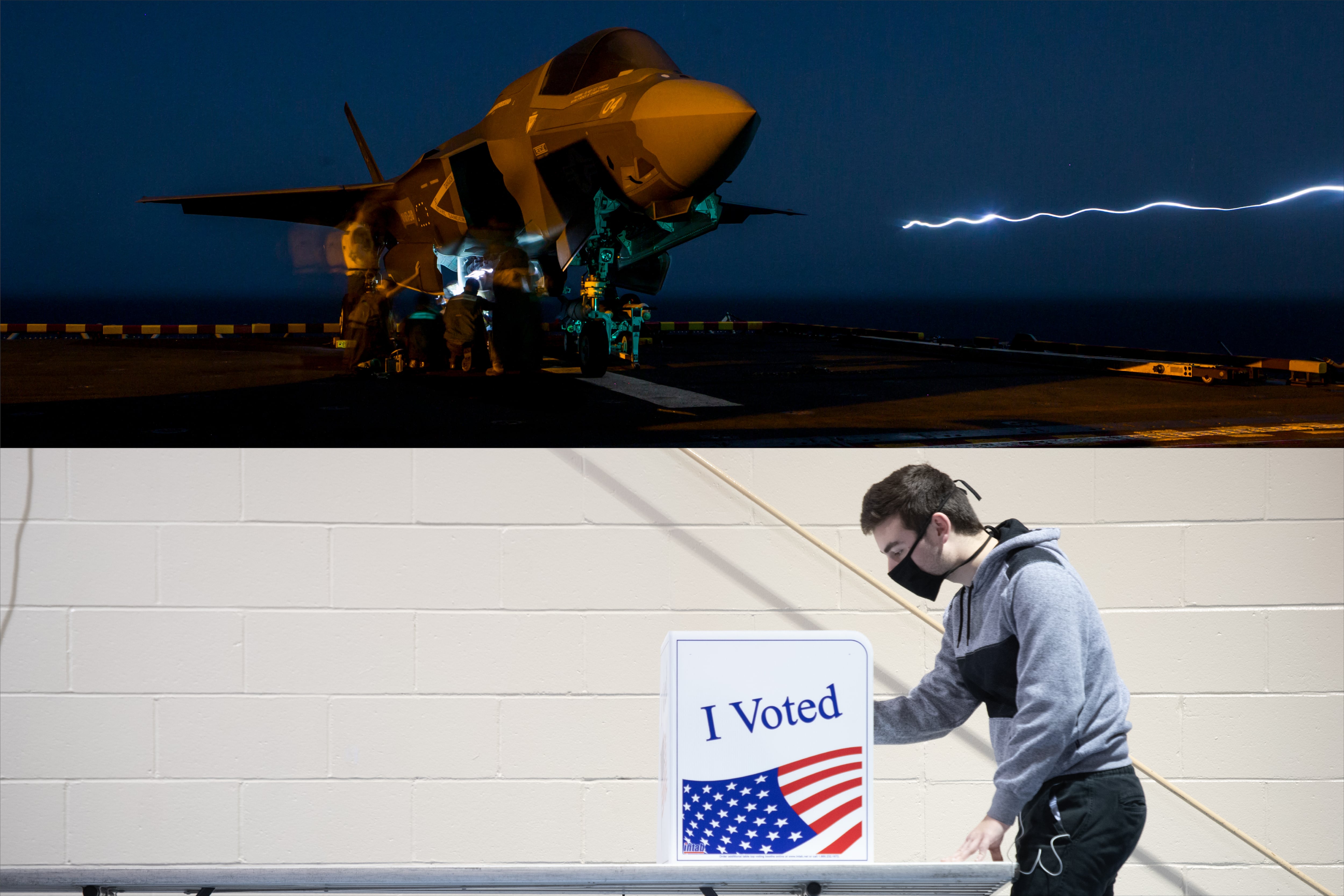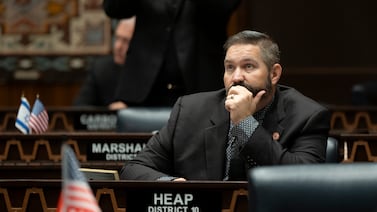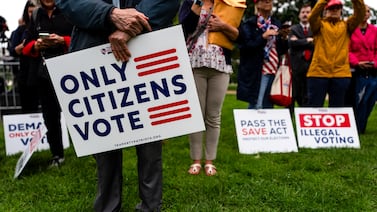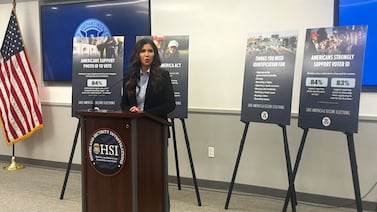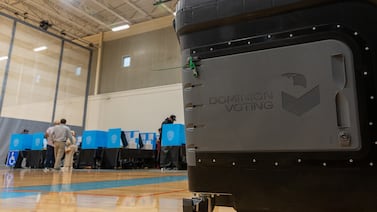A version of this post was originally distributed in Votebeat’s weekly newsletter. Sign up here.
Months after Democratic leaders in Congress backed away from providing billions of badly needed dollars to support local election improvements, we now learn that the Senate plans to add the very same amount of money to the Defense Department’s $715 billion budget — even though the Pentagon didn’t ask for it.
You read that right: Congress gave an extra $10 billion to the Pentagon but zero to elections, ignoring multiple warnings and research the past three years emphasizing that America’s crumbling, underfunded election infrastructure presents a national security risk.
It’s not as if the threats to elections are subtle. The last six years have brought us stunning misinformation circulated by hostile foreign nations; direct attacks by those countries on our election infrastructure; a violent insurrection at the Capitol spurred by a former president convinced he is the rightful leader of the country; and continued violent threats to election administrators. Meanwhile, election administrators have been screaming into the wind, trying to convince Congress that Windows 7 is not a sustainable operating system for elections. Anemic election budgets are also to blame for the paperless voting machine problem. Despite a recent push for paper-backed voting, several counties are stuck with paperless systems. That makes them frequent targets of election skeptics, especially amid the intense new attention on audits and claims of hacked machines.
Election security is a war in which America is losing ground. Our generals are our representatives, and county workers are the soldiers, being sent into battle against hostile nation states with broken guns and body armor made of cardboard. The combatants are not the U.S. government versus Russia, or the U.S. government versus China. It is your county clerk versus those massive, well-resourced countries, and our representatives have told them to figure it out on their own.
You would expect Congress to have a beefy justification for withholding this funding. But, the truth is, there isn’t: Nancy Pelosi’s staff told me that her singular reason for nixing that $10 billion was that spending via the reconciliation process provides “no guard rails.” That, in theory, Republican states might spend the money to suppress the vote, rather than support it. I asked for evidence. No one could offer me a single example of a state spending federally apportioned money on restrictive ends. It costs less money, not more, to shut down polling places. In Florida, a clerk has removed nine of the county’s 10 drop boxes due to lack of funding, for example.
The sheer size of the problem should be motivation enough. As participants on any number of Votebeat panels have attested, elections infrastructure is dwindling. From my piece a few weeks ago: “Thousands of counties rely on Windows 7 to run their voting systems — a deeply outdated operating system no longer getting regular security updates. At least 13 states use voting machines purchased before the invention of the iPhone. Thousands of counties relied on privately funded grants distributed by two nonprofits — the Center for Tech and Civic Life and the Center for Election Innovation & Research — for protective equipment during the pandemic and to make long-needed upgrades to their systems.”
As Democrats in Congress often remind us, the pandemic is not over. And as they’d like to forget, next year is an election year. These needs are not diminishing—they are quickly growing. And if Congress wants to prove it’s concerned about national security, even a modest investment in local election administration would protect us against vulnerabilities that even an overfunded Pentagon can’t shore up.
Back Then
After 2000, a Republican-controlled Congress passed the Help America Vote Act, and then the law was signed by a Republican president. That’s a bit hard to imagine now, but it happened. Even though the hanging chads and Brooks Brothers Riot of that year now seem comparatively quaint, it’s still stunning to remember that almost 20 years ago Congress still managed to get something done as it related to elections. That doesn’t mean the states followed through. While states like Florida — which was the most embarrassed by that year’s meltdown — made big changes quickly, many others lagged behind (and some still do). In 2001, watching the same kind of malaise at the state level that is now impacting the federal government, Common Cause President Scott Harshbarger complained, “By looking at what’s happened in state legislatures in the past year, you’d never know that we had a genuine electoral crisis on our hands just a year ago.” That quote could be the title of this newsletter.
In Other Voting News
- We never expected anything else, but it’s official anyway: The Democrats’ latest push for voting reform is going nowhere in the Senate. This week Senate Republicans blocked consideration of the Freedom to Vote Act, which had been crafted as a compromise with West Virginia Sen. Joe Manchin. It is unclear where Democrats go from here, but what’s different for the next chapter is that President Biden is now calling for changes to the filibuster rules.
- CNN has a good summary of how the Biden DOJ has shifted the department’s course on voting rights. While the Trump DOJ actively avoided voting rights cases or took the position of states that sought to limit rights, the Biden DOJ has moved hard in the other direction.
- A new secretary of state has finally been appointed in Texas, and if you’ve been following voting for a while you probably know his name: John Scott. He’s a Fort Worth attorney who has tried several cases related to elections, including — as the Texas Tribune pointed out — a case involving Trump. It’s important to remember that Scott represented Trump in Pennsylvania for only one business day before removing himself. He previously served as a deputy attorney general in Texas and defended the state’s voter ID law in 2014.
- Also in Texas news: The House adjourned without taking up the Senate bill that would have forced an audit of the state’s 2020 votes — a bill Trump personally requested. There will be no audit.
- Our partners at Bridge Michigan have a story that won’t surprise many who follow the news about Republican secretary of state candidate Kristina Karamo: She’s speaking at a QAnon event this weekend in Las Vegas. Karamo denied knowledge that the event was affiliated with QAnon, even after she shared social media imagery laden with QAnon references.
- Georgia says it will not investigate claims from True the Vote and the state Republican Party that cellphone location data shows hundreds of cases of illegal ballot harvesting in the 2020 elections. A letter from the Georgia Bureau of Investigation informed the two groups that their evidence “does not rise to the level of probable cause that a crime has been committed.”
- And lastly, some shameless self promotion. We co-published the oral history of our beginnings with Poynter this week, a podcast featuring six of the 15 journalists Votebeat hired to cover the 2020 election. We hope you’ll listen.

